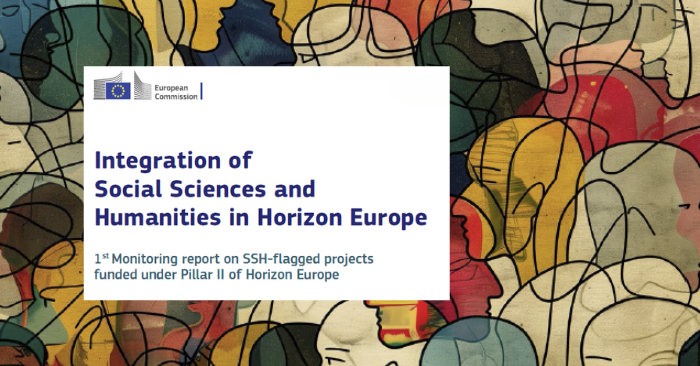
Integration of the Social Sciences and Humanities in Horizon Europe: Initial Results 2021–2023

Strong participation of SSH in Horizon Europe
Between 2021 and 2023, 40% of the topics in Pillar II (‘Global Challenges and European Industrial Competitiveness’) of Horizon Europe were identified as relevant to the social sciences and humanities (SSH-flagged).
- 7.2 billion euro (41% of the total budget) was allocated to these topics.
- 88% of projects in SSH-flagged topics had at least one SSH partner.
- Overall, 22% of all project partners came from SSH disciplines, and 42% of projects were coordinated by SSH institutions.
- Partners from Italy, Germany and Spain were particularly active, accounting for almost a third of all SSH participation.
Differences between the clusters
The integration of SSH varies depending on the thematic cluster:
- Cluster 2 (Culture, Creativity & Inclusive Society): All projects are SSH-based, with 52% of partners.
- Cluster 5 (Climate, Energy & Mobility) and Cluster 6 (Food, Bioeconomy, Environment): Approximately 21% of partners are SSH in each case, demonstrating the relevance of social science expertise for transformation processes.
- Cluster 3 (Civil Security): 20% SSH participation, e.g. in projects on radicalisation or cyber security.
- Cluster 1 (Health) and Cluster 4 (Digital, Industry & Space): With SSH-shares of 12% and 14% respectively, these areas are significant underrepresented, despite the importance of social aspects such as ethics, acceptance and user-friendliness.
Good practices and recommendations
The report highlights that successful projects share a number of common success factors:
- Common vocabulary: Different disciplines often use different terminology. Having a uniform understanding of terms facilitates cooperation.
- Early involvement of SSH: When social sciences and humanities are involved from the outset, technological innovations can be better adapted to societal needs.
- Interdependence of work packages: Projects benefit when SSH tasks are closely interlinked with scientific and technical work packages rather than operating in isolation.
- Strong coordination ist important: Project managers who actively moderate interdisciplinary teams can increase the impact and acceptance of the results.
Outlook
SSH integration has improved noticeably since Horizon 2020 – with the budget share for SSH-flagged topics rising from 33% to 41%. By the end of Horizon Europe in 2027, the European Commission will collect further data and evaluate the quality of SSH participation in detail.
Horizon Europe will therefore promote technological innovations and socially relevant solutions, ranging from the energy transition to health research and digital transformation.




